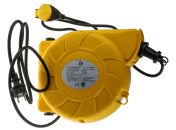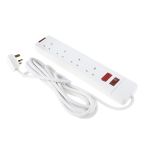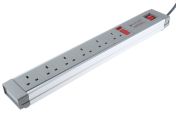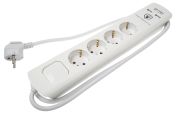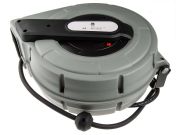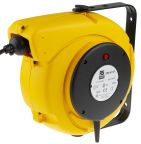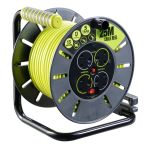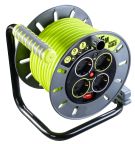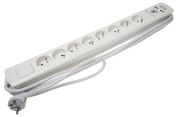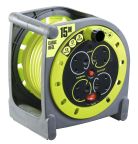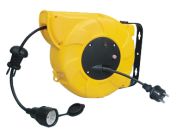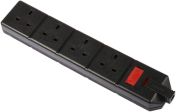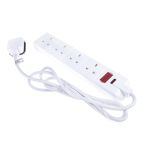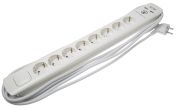- Automation & Control Gear
- Cables & Wires
- Enclosures & Server Racks
- Fuses & Circuit Breakers
- HVAC, Fans & Thermal Management
- Lighting
- Relays & Signal Conditioning
- Switches
- Batteries & Chargers
- Connectors
- Displays & Optoelectronics
- ESD Control, Cleanroom & PCB Prototyping
- Passive Components
- Power Supplies & Transformers
- Raspberry Pi, Arduino, ROCK, STEM Education & Development Tools
- Semiconductors
Extension Leads & Cable Reels
An extension lead (also called an extension cable or extension cord) is a length of power cable with one or multi sockets at one end and a plug at the other end. Electrical extension leads allow you to use appliances at a greater distance from the mains power socket than the integrated cable within the device. Electrical extension leads offer a simple, effective and efficient way of managing any length or combination of wires. Multi-plug extension leads can have numerous sockets and are able to power multiple devices from just one main socket.
What Type of Extension Leads are There?
Depending on the equipment you're powering and the distances between sockets and appliances, different types of extension lead may be most suitable. Some of your options include:
Single Extension Leads
Single extension leads only have one socket and are commonly used to provide power to a part of the room where there is no power outlet. They must never be combined in series with other extension sockets or multi-socket adaptors.
Multi Socket Extension Leads
Multi socket extension leads sometimes referred to as multi-gang extension leads have more than one socket (or gang). They can be used to power multiple devices and increase the number of plugs that can be connected to one main socket.
Cable Reels
If you are looking for an industrial extension cord in Malaysia, you may consider cable reels that come with one or more sockets or gangs. Cable reel extension sockets allow you to power devices from a greater distance. The cable is supplied on a reel with integrated sockets. Some models have an auto-rewind function without needing to manually wind the cable back in after use. Some cable reel extension leads also feature built-in RCDs (residual current devices) that prevent electrical shocks if there is a fault.
Other Key Features
Here are some other features to look out for when choosing extension leads:
Length of Cable
- Options Available: Extension leads and cable reels come in various lengths to suit different needs. Common lengths include 1m, 5m, and 15m. Long extension leads up to 50m or more are available for industrial uses.
- Why It’s Important: The right length ensures that you can reach distant power sources without excessive slack, which can be a tripping hazard.
Number of Sockets
- Single vs. Multi-Socket Options: Single extension leads have one socket, ideal for powering a single device. Multi-socket extension leads, also known as multi-gang extension leads, can power multiple devices simultaneously, increasing the number of available outlets.
- Use Cases: Multi-socket options are useful when multiple devices need power, such as in offices or workshops.
IP Rating
- Protection Against Dust and Water: The IP (Ingress Protection) rating indicates the level of protection against dust and water. For example, IP44 offers protection against splashing water, while IP65 provides complete protection against dust and low-pressure water jets.
- How to Choose: Choose an extension lead or cable reel with an appropriate IP rating based on the environment where it will be used. Higher IP ratings are essential for outdoor or industrial settings.
Surge Protection
- Benefits: Surge protection helps protect connected devices from voltage spikes, which can damage electrical equipment.
- Why It’s Important: This feature is crucial for sensitive electronics and in areas prone to electrical surges.
Weight Rating
- Maximum Load Capacity: The weight rating indicates the maximum current (in amps) that the extension lead, or cable reel can safely handle. Common ratings include up to 13A for household use and up to 16A for industrial applications.
- Safety Considerations: Ensure the extension lead or cable reel can handle the total current draw of all connected devices to prevent overheating and potential fire hazards.
Industrial Application of Extension Leads
Here are the diverse applications of extension leads across various industrial sectors:
Factories
In factories, extension leads facilitate the connection of heavy-duty power tools, assembly line equipment, and testing apparatus to distant power outlets. This enhances operational efficiency and contributes to a safer working environment by reducing the need for tangled wires and overloaded circuits.
Processing Plants
Processing plants are dependent on extension leads to provide electrical power to various equipment. From conveyors and mixers to pumps and packaging machines, these leads enable the seamless flow of operations.
Warehouse
Warehouses require extension leads for tasks such as powering forklifts, pallet jacks, lighting systems, and inventory management tools. The adaptability of extension leads allows for easy reconfiguration of workstations and efficient utilisation of space. A 1m extension lead can be particularly handy for short-range connections in these settings.
Industrial Facilities
In industrial facilities, extension leads cater to the unique power requirements of various operations such as manufacturing, assembly, research and development. They enable the connection of specialised equipment, laboratory instruments, and testing apparatus, fostering innovation and productivity.
Safety Precautions
Extension leads are a convenient way to extend the reach of your electrical appliances, but it's important to make sure you are using them safely:
- Extension leads must not be plugged into one another or used in series. This can cause the socket to overload.
- Don't overload sockets by plugging in appliances that exceed the maximum current rating.
- If extension lead cables are in areas where they could be a hazard, you should fix the cable down or cover it with a protective rubber strip.
- When using cable reels, you must unwind the full length of the cable to prevent overheating.
As a leader in the global distribution of electronics, automation and control components, mechanical tools and consumables, you can always rely on RS for high-quality parts. Besides extension leads, you can also check out our selection of electrical contactors, zip ties and more today.
Frequently Asked Questions About Extension Leads
Do extension leads use a lot of electricity?
Extension leads themselves don't consume significant amounts of electricity. However, using long or low-quality leads can result in a voltage drop, leading to slight power loss and potential appliance damage. Choosing the right type and length of extension cord is crucial for safe and efficient operation.
How long do extension leads last?
Extension leads can last many years, but their lifespan depends on several factors, including frequency of use, environmental conditions, and proper care. Regular inspection for damage and replacing worn-out cords is essential to ensure industrial workplace safety and prevent electrical hazards.
Is it safe to use 2 extension leads?
Generally, it's not recommended to connect multiple extension leads together as it increases the risk of overheating, voltage drop, and potential fire hazards. It's safer to use a single, appropriately sized extension lead for the required distance.
Delivery information
Get your extension leads delivered right when you need them. We offer reliable next working day delivery, or you can choose a specific day for delivery within the next 12 months. For more information, visit our Delivery Page.
Popular Searches
Related links
- Power Cords
- SAM ZJ.215 3/8 in Square Extension Cord, 250 mm Overall
- Bticino 5 Socket 2P+T Extension Socket, 250 V ac
- Bticino 1.5m 6 Socket 2P+T Extension Socket, 250 V ac
- Bticino 1.5m 3 Socket 2P+T 250 V ac
- Schneider Electric 2m 1 Socket Extension Lead Open Reel IP44
- Bticino 1.5m 6 Socket 2P+T 250 V ac
- APC 3 Socket Type F - Schuko Plug Extension Lead, 230 V
